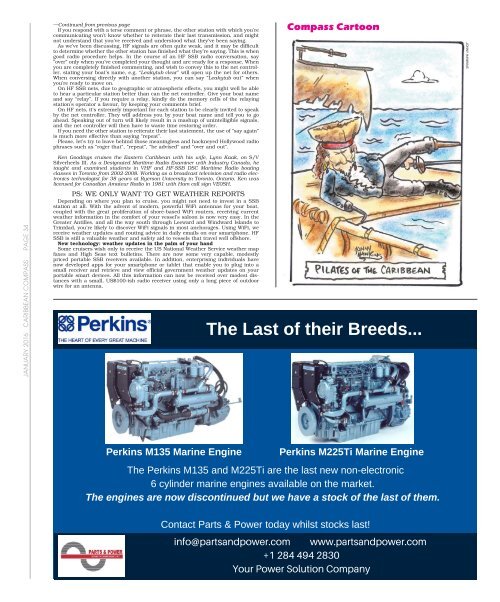Caribbean Compass Yachting Magazine January 2016
Welcome to Caribbean Compass, the most widely-read boating publication in the Caribbean! THE MOST NEWS YOU CAN USE - feature articles on cruising destinations, regattas, environment, events...
Welcome to Caribbean Compass, the most widely-read boating publication in the Caribbean! THE MOST NEWS YOU CAN USE - feature articles on cruising destinations, regattas, environment, events...
Create successful ePaper yourself
Turn your PDF publications into a flip-book with our unique Google optimized e-Paper software.
— Continued from previous page<br />
If you respond with a terse comment or phrase, the other station with which you’re<br />
communicating won’t know whether to reiterate their last transmission, and might<br />
not understand that you’ve received and understood what they’ve been saying.<br />
As we’ve been discussing, HF signals are often quite weak, and it may be difficult<br />
to determine whether the other station has finished what they’re saying. This is when<br />
good radio procedure helps. In the course of an HF SSB radio conversation, say<br />
“over” only when you’ve completed your thought and are ready for a response. When<br />
you are completely finished commenting, and wish to convey this to the net controller,<br />
stating your boat’s name, e.g. “Leakytub clear” will open up the net for others.<br />
When conversing directly with another station, you can say “Leakytub out” when<br />
you’re ready to move on.<br />
On HF SSB nets, due to geographic or atmospheric effects, you might well be able<br />
to hear a particular station better than can the net controller. Give your boat name<br />
and say “relay”. If you require a relay, kindly do the memory cells of the relaying<br />
station’s operator a favour, by keeping your comments brief.<br />
On HF nets, it’s extremely important for each station to be clearly invited to speak<br />
by the net controller. They will address you by your boat name and tell you to go<br />
ahead. Speaking out of turn will likely result in a mashup of unintelligible signals,<br />
and the net controller will then have to waste time restoring order.<br />
If you need the other station to reiterate their last statement, the use of “say again”<br />
is much more effective than saying “repeat”.<br />
Please, let’s try to leave behind those meaningless and hackneyed Hollywood radio<br />
phrases such as “roger that”, “repeat”, “be advised” and “over and out”.<br />
<strong>Compass</strong> Cartoon<br />
JONNY HAWKINS<br />
JANUARY <strong>2016</strong> CARIBBEAN COMPASS PAGE 34<br />
Ken Goodings cruises the Eastern <strong>Caribbean</strong> with his wife, Lynn Kaak, on S/V<br />
Silverheels III. As a Designated Maritime Radio Examiner with Industry Canada, he<br />
taught and examined students in VHF and HF-SSB DSC Maritime Radio boating<br />
classes in Toronto from 2002-2008. Working as a broadcast television and radio electronics<br />
technologist for 38 years at Ryerson University in Toronto, Ontario, Ken was<br />
licensed for Canadian Amateur Radio in 1981 with Ham call sign VE0SH.<br />
PS: WE ONLY WANT TO GET WEATHER REPORTS<br />
Depending on where you plan to cruise, you might not need to invest in a SSB<br />
station at all. With the advent of modern, powerful WiFi antennas for your boat,<br />
coupled with the great proliferation of shore-based WiFi routers, receiving current<br />
weather information in the comfort of your vessel’s saloon is now very easy. In the<br />
Greater Antilles, and all the way south through Leeward and Windward Islands to<br />
Trinidad, you’re likely to discover WiFi signals in most anchorages. Using WiFi, we<br />
receive weather updates and routing advice in daily emails on our smartphone. HF<br />
SSB is still a valuable weather and safety aid to vessels that travel well offshore.<br />
New technology: weather updates in the palm of your hand<br />
Some cruisers wish only to receive the US National Weather Service weather map<br />
faxes and High Seas text bulletins. There are now some very capable, modestly<br />
priced portable SSB receivers available. In addition, enterprising individuals have<br />
now developed apps for your smartphone or tablet that enable you to plug into a<br />
small receiver and retrieve and view official government weather updates on your<br />
portable smart devices. All this information can now be received over modest distances<br />
with a small, US$100-ish radio receiver using only a long piece of outdoor<br />
wire for an antenna.<br />
The Last of their Breeds...<br />
Perkins M135 Marine Engine<br />
Perkins M225Ti Marine Engine<br />
The Perkins M135 and M225Ti are the last new non-electronic<br />
6 cylinder marine engines available on the market.<br />
The engines are now discontinued but we have a stock of the last of them.<br />
Contact Parts & Power today whilst stocks last!


















